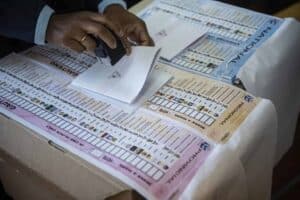Parties on the fringe of the existing political system have ideas on how to shape electoral reform, but disrupting the status quo is unlikely.

The Electoral Reform Consultation Panel (ERCP) is accepting submissions on potential electoral reform.
The panel was established to meet a stipulation of the Electoral Amendment Act signed by President Cyril Ramaphosa in April and will make non-binding recommendations on changing the way South Africans elect the National Assembly and the provincial legislature members.
Members of the public, civil organisations and political parties can submit their proposals by 30 September, with recommendations to be presented by the panel by the end of May 2025.
It is chaired by Richard Sizani, the current chairperson of the Public Service Commission. The panel’s other eight members include current IEC Chief Electoral Officer Sy Mamabolo.
Fewer provinces and more parliament
South Africa’s electoral processes have only undergone minor alterations since 1994, with voters receiving a third regional representation ballot for the first time on 29 May.
Few parties have proposed a disruption of the status quo, but the introduction of uMkhonto weSizwe (MK) party proposed ideas that are at direct odds with current institutions.
ALSO READ: MK challenges constitution, critiques voting system
The MK Party did not focus on ballot box intricacies but advocated for the removal of the Roman-Dutch law, parliamentary supremacy over constitutional supremacy and the reduction of the number of provinces.
The party also spearheaded an initial challenge to the 29 May election results, but that momentum fizzled out as the government of national unity was formed.
The end of political parties
On the other end of the scale, plucky outsiders Organic Humanity Movement (OHM) have proposed a system many South Africans have found difficult to comprehend.
Their plan calls for an end to the political party system, replacing it with direct elections where the citizens vote for the president, not the composition of parliament.
ALSO READ: Electoral reform stalls as top political parties prioritize power over change
OHM leader Lauren Evanthia Bernardo said she was “intrigued” by the establishment of the panel but questioned its composition.
“When decisions are made in government, we must be cautious that the people making those decisions are not only coming from a place of theoretical knowledge and with an unfair advantage of power,” Bernardo told The Citizen.
The OHM founder added that they would be making a submission to the ERCP that would be similar to their 2024 manifesto.
“System change is an opportunity to start afresh and build a nation with a new and stronger identity, solidifying our nation’s sovereignty so we can start to thrive,” Bernardo said.
“Our vision remains the same,” she declared.
Complimentary’ panel
My Vote Counts (MVC) is a non-profit organisation that has focused on electoral reform as well as the money flowing through domestic politics.
At the launch of its own Civil Society Electoral Reform Panel, it stated the need to bridge the gap between ordinary South Africans and their elected officials.
“We don’t see ourselves as competition to the panel that has already been appointed. We will be trying to compliment whatever they will develop,” said Terry Tselane, referencing the ERCP.
MVC’ political systems researcher Boikanyo Moloto confirmed to The Citizen that they would be making a submission to the ERCP but could not divulge more as that submission was still being formulated.
Just over one month remains for submissions, giving South Africans time to add their views on how the future of the country should look.






